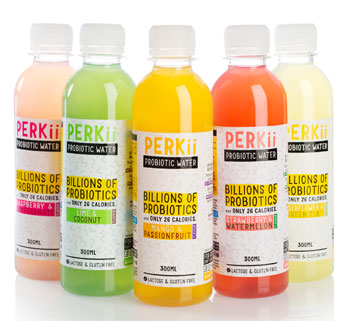Dr Lai Tran Myth Busting Popular Health Products Interview

Interview with Dr Lai Tran, University of Queensland (UQ) scientist and leading biotechnology expert
Question: Can you share with us some of the popular health products that they do one thing, but may not necessarily stack up scientifically?
Dr Lai Tran: There are a few products popping up lately because of trends towards optimising good gut health, like Kombucha varieties or dairy products. These types of products contain strains of probiotics. The thing about consuming probiotics is that they must remain alive, in sufficient numbers, at the time of consumption, through the acidity in your stomach, and make its way to the gut where it can impart its beneficial health benefits. Basically, the area in your body where they can actually do their job. Fermented probiotic products, which are reportedly studied for health benefit claims. But there is no warranty that the probiotic in those products remain alive towards the end of its shelf life because they are in their free cell form e.g. they are not covered in any coat of protection to make it through the acidity in your stomach. So in other terms, there's no guarantee they can achieve what they set out to do without layering them up with armour. You can assure yourself by doing all you can for your gut by consuming a probiotic drink, for example PERKii, which armour-plates their probiotics with special protection through the digestive system.
Question: What are your thoughts on kombucha-based beverages? Are the health benefits of Sauerkraut, Kimchi or pickles strong?
Dr Lai Tran: Most of these products are fermented and contain naturally developed probiotics. As a result of these natural characters, they claim to have health benefits. When looking at options, it's important to evaluate sugar content, whether it was clinically studied, if the probiotics included are scientifically encapsulated with a coat of protection, and there's a high number of the strain included that can survive.
Kombucha and pickles are both types of fermented food or drink. But they both contain undefined strains of lactic acid bacteria and yeast, which is not necessarily a qualified probiotic bacteria. Both also have a high acidity level, which might kill the probiotic during their shelf life. The bacteria and yeast within those products are also in free cell form, i.e. not coated in microgel technology that can provide protection against the acidity of the stomach. As a result, how do we classify those products when the strains are not clearly indicated and the numbers of live bacteria are not clear?
As we point out the differences between many available commercial probiotics, the key things that should be emphasised and taken away from this discussion is:
Probiotics in acidic food and drink products with a long shelf life must use the ProGel technology and coating formula to protect the probiotic through gastric transit at the time of consumption
A product must use a defined and well-studied probiotic strain and must comply with the standards of a qualified probiotic product
 Question: What are your feeling surrounding products such as coconut yoghurt?
Question: What are your feeling surrounding products such as coconut yoghurt?
Dr Lai Tran: There are many things to consider when it comes to probiotic dairy products. Most yoghurt products are fermented, have huge amounts of added sugar, are full of artificial sweeteners or emulsifiers (which actually can cause quite a bit of damage to our gut) with only four weeks' shelf life. Meaning, the probiotic within the product often dies off due to post acidification in the yoghurt towards the end of its shelf life. There's been a huge rise in individuals that are now aware of the benefits of clean and healthy eating, but many go for products that are 'trending". A better alternative for health conscious and vegan consumers is a probiotic drink like PERKii, which is low in sugar, gluten free, has a higher number of probiotic that can survive gastric transit i.e. through your stomach, and also has a four-month shelf life.
Question: How common is it for health products to not deliver?
Dr Lai Tran: If we look at probiotic products specifically, it all comes down to whether they align in accordance with the Food and Agriculture Organization and World Health Organisation's definition of effectiveness i.e. live microorganisms which when administered in adequate number confer a benefit on the host. There's a warranty with products that contain probiotics that are coated in organic based microgels that create a protective barrier that can withstand the acidic environments of your stomach, before entering more alkaline environments like the gut. PERKii mentioned previously is a great example of this.
Question: Why is it so important to you to bust these hyped-up products?
Dr Lai Tran: We've actually seen a growth in awareness about holistic health now among individuals, more so than they did five years ago. With this growth of health awareness in mind, we are seeing a higher demand for popular products hitting shelves, but that doesn't mean they've ticked all the boxes and consumers may be ill-aware of what to look for when making their purchases.
Question: What foods should we be consuming more of?
Dr Lai Tran: Not many people realise the importance of gut health for overall wellbeing. After all, they call it the second brain of the body. We need to ensure that we consume both prebiotic and probiotic rich foods and beverages to create the most supportive environment for our gut health to flourish. The probiotic rich foods we consume must contain probiotics that are able to successfully make their way to our gut, as well as those that are not transient, but rather able to reside in our gut and flourish there. Ahead of cold and flu season, we should all be upping our intake, particularly those with the Lactobacillus strain found in PERKii, as this will really help boost immunity so we can fight off those winter lurgies.
Question: How can we detect which products are clear in their labelling?
Dr Lai Tran: There's been a lot of discussion in the last decade on what is a qualified probiotic product and the pursuit to obtain a standard for all producers and a downstream application before reaching consumers is continuing. A product that has been extensively studied will have labels that are clear, easy to understand and transparent. The best way to detect which products will meet expectations, more specifically probiotic rich foods, is by identify whether they have billions of clinically studied and protected probiotics that can survive, in adequate amounts, such as the Lactobacillus Lc341, which is among one of the best documents strains, and found in PERKii.
Interview by Brooke Hunter
Dr Lai Tran: There are a few products popping up lately because of trends towards optimising good gut health, like Kombucha varieties or dairy products. These types of products contain strains of probiotics. The thing about consuming probiotics is that they must remain alive, in sufficient numbers, at the time of consumption, through the acidity in your stomach, and make its way to the gut where it can impart its beneficial health benefits. Basically, the area in your body where they can actually do their job. Fermented probiotic products, which are reportedly studied for health benefit claims. But there is no warranty that the probiotic in those products remain alive towards the end of its shelf life because they are in their free cell form e.g. they are not covered in any coat of protection to make it through the acidity in your stomach. So in other terms, there's no guarantee they can achieve what they set out to do without layering them up with armour. You can assure yourself by doing all you can for your gut by consuming a probiotic drink, for example PERKii, which armour-plates their probiotics with special protection through the digestive system.
Question: What are your thoughts on kombucha-based beverages? Are the health benefits of Sauerkraut, Kimchi or pickles strong?
Dr Lai Tran: Most of these products are fermented and contain naturally developed probiotics. As a result of these natural characters, they claim to have health benefits. When looking at options, it's important to evaluate sugar content, whether it was clinically studied, if the probiotics included are scientifically encapsulated with a coat of protection, and there's a high number of the strain included that can survive.
Kombucha and pickles are both types of fermented food or drink. But they both contain undefined strains of lactic acid bacteria and yeast, which is not necessarily a qualified probiotic bacteria. Both also have a high acidity level, which might kill the probiotic during their shelf life. The bacteria and yeast within those products are also in free cell form, i.e. not coated in microgel technology that can provide protection against the acidity of the stomach. As a result, how do we classify those products when the strains are not clearly indicated and the numbers of live bacteria are not clear?
As we point out the differences between many available commercial probiotics, the key things that should be emphasised and taken away from this discussion is:
Probiotics in acidic food and drink products with a long shelf life must use the ProGel technology and coating formula to protect the probiotic through gastric transit at the time of consumption
A product must use a defined and well-studied probiotic strain and must comply with the standards of a qualified probiotic product
 Question: What are your feeling surrounding products such as coconut yoghurt?
Question: What are your feeling surrounding products such as coconut yoghurt? Dr Lai Tran: There are many things to consider when it comes to probiotic dairy products. Most yoghurt products are fermented, have huge amounts of added sugar, are full of artificial sweeteners or emulsifiers (which actually can cause quite a bit of damage to our gut) with only four weeks' shelf life. Meaning, the probiotic within the product often dies off due to post acidification in the yoghurt towards the end of its shelf life. There's been a huge rise in individuals that are now aware of the benefits of clean and healthy eating, but many go for products that are 'trending". A better alternative for health conscious and vegan consumers is a probiotic drink like PERKii, which is low in sugar, gluten free, has a higher number of probiotic that can survive gastric transit i.e. through your stomach, and also has a four-month shelf life.
Question: How common is it for health products to not deliver?
Dr Lai Tran: If we look at probiotic products specifically, it all comes down to whether they align in accordance with the Food and Agriculture Organization and World Health Organisation's definition of effectiveness i.e. live microorganisms which when administered in adequate number confer a benefit on the host. There's a warranty with products that contain probiotics that are coated in organic based microgels that create a protective barrier that can withstand the acidic environments of your stomach, before entering more alkaline environments like the gut. PERKii mentioned previously is a great example of this.
Question: Why is it so important to you to bust these hyped-up products?
Dr Lai Tran: We've actually seen a growth in awareness about holistic health now among individuals, more so than they did five years ago. With this growth of health awareness in mind, we are seeing a higher demand for popular products hitting shelves, but that doesn't mean they've ticked all the boxes and consumers may be ill-aware of what to look for when making their purchases.
Question: What foods should we be consuming more of?
Dr Lai Tran: Not many people realise the importance of gut health for overall wellbeing. After all, they call it the second brain of the body. We need to ensure that we consume both prebiotic and probiotic rich foods and beverages to create the most supportive environment for our gut health to flourish. The probiotic rich foods we consume must contain probiotics that are able to successfully make their way to our gut, as well as those that are not transient, but rather able to reside in our gut and flourish there. Ahead of cold and flu season, we should all be upping our intake, particularly those with the Lactobacillus strain found in PERKii, as this will really help boost immunity so we can fight off those winter lurgies.
Question: How can we detect which products are clear in their labelling?
Dr Lai Tran: There's been a lot of discussion in the last decade on what is a qualified probiotic product and the pursuit to obtain a standard for all producers and a downstream application before reaching consumers is continuing. A product that has been extensively studied will have labels that are clear, easy to understand and transparent. The best way to detect which products will meet expectations, more specifically probiotic rich foods, is by identify whether they have billions of clinically studied and protected probiotics that can survive, in adequate amounts, such as the Lactobacillus Lc341, which is among one of the best documents strains, and found in PERKii.
Interview by Brooke Hunter
MORE



